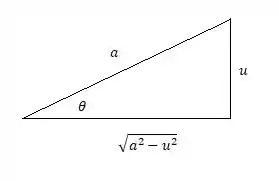Calcular a integral definida:
Passo 1
Vamos calcular a integral indefinida e depois utilizamos o Teorema Fundamental do Cálculo para aplicar os limites de integração:
Primeiro vamos fazer uma substituição para a integral ficar no formato para aplicar uma substituição trigonométrica:
Substituindo temos:
Passo 2
Para resolver essa integral vamos fazer uma substituição trigonométrica, temos que a expressão é da forma , nesse formato de expressão vamos fazer e utilizar a identidade trigonométrica :
Substituindo temos:
Agora usando a identidade trigonométrica:
Agora vamos usar outra identidade trigonométrica:
Assim ficamos com:
Passo 3
Com a primeira é fácil achar as primitivas da função, usando as expressões da Tabela de Integrais Indefinidas:
Agora é só aplicar:
Com a segunda vamos fazer uma substituição:
Substituindo:
Agora usando a expressão da Tabela de Integrais Indefinidas:
E agora plicando:
Passo 4
Agora é só juntar tudo:
Calma, não terminou ainda, vamos ter que voltar para a variável original :
Temos que , ou seja, , assim vamos usar o triângulo retângulo abaixo para achar e :

Assim:
Passo 5
E por último substituindo:
Passo 6
Pronto, já encontramos a integral indefinida, agora é só calcular a integral definida usando o Teorema Fundamental do Cálculo:
Ficamos então com: